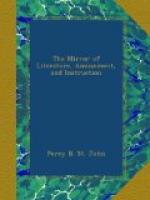wars in the latter reign, and was taken prisoner by
the king’s party at Rochester Castle; his own
castle at Belvoir also falling into the royal hands.
He was likewise one of the twenty-five barons, whose
signatures were attached to Magna Charta and the charter
of Forests at Runnemede. This lord richly endowed
the priory of Belvoir, and founded and endowed a hospital
at Wassebridge, between Stamford and Uffingham, where
he was buried in 1236. Isabel, of the house of
Albini, now married to Robert de Ros, or Roos, baron
of Hamlake, and thus carried the estates into a new
family. The bounds of the lordship of Belvoir,
at this time, are described by a document printed
in Nichols’s History. This new lord obtained
a license from Henry III. to hold a weekly market and
annual fair at Belvoir. He died in 1285, and
his body was buried at Kirkham, his bowels before
the high altar at Belvoir, and his heart at Croxton
Abbey; it being a practice of that age for the corporeal
remains of eminent persons to be thus distributed
after death. The next owner, William de Ros was,
in 1304, allowed to impark 100 acres under the name
of Bever Park, which was appropriated solely
to the preservation of game. He died in 1317:
his eldest son, William de Ros, took the title of
Baron Ros, of Hamlake, Werke, Belvoir, and Trusbut;
was Lord High Admiral of England, and sat in parliament
from 11 Edw. II. to 16 Edw. III; he died
in 1342. Sir William de Ros, knight, was Lord
High Treasurer to Henry IV.; he died at the Castle
in 1414, and bequeathed 400_l._ “for finding
ten honest chaplains to pray for his soul, and the
souls of his father, mother, brethren, sisters, &c.”
for eight years within his chapel at Belvoir castle.
John and William Ros, the next owners, were distinguished
in the wars of France; the former was slain at Anjou;
the latter died in 1431, and was succeeded by his
son, Edmund, an infant, who, on coming of age, engaged
in the civil wars of York and Lancaster: he was
attainted in 1641, and his noble possessions parcelled
out by Edward IV; the honour, castle, and lordship
of Belvoir, with the park and all its members, and
the rent called castle-guard, (then an appurtenance
to Belvoir,) being granted in 1647, to Hastings the
court corruptionist.[2] The attainder was, however,
repealed, and Edmund, Lord Ros re-obtained possession
of all his estates in 1483: he died at Enfield,
and the estates then passed into the Manners family,
as we have stated.
[2] “The Lord Ros took Henry the VIth’s part against King Edward, whereupon his lands were confiscated, and Belever Castle given in keeping to Lord Hastings, who coming thither on a time to peruse the ground, and to lie in the castle, was suddenly repelled by Mr. Harrington, a man of power thereabouts, and friend to the Lord Ros. Whereupon the Lord Hastings came thither another time with a strong power, and upon a raging will spoiled the castle, defacing the roofs, and taking the leads off them.—Then fell all




